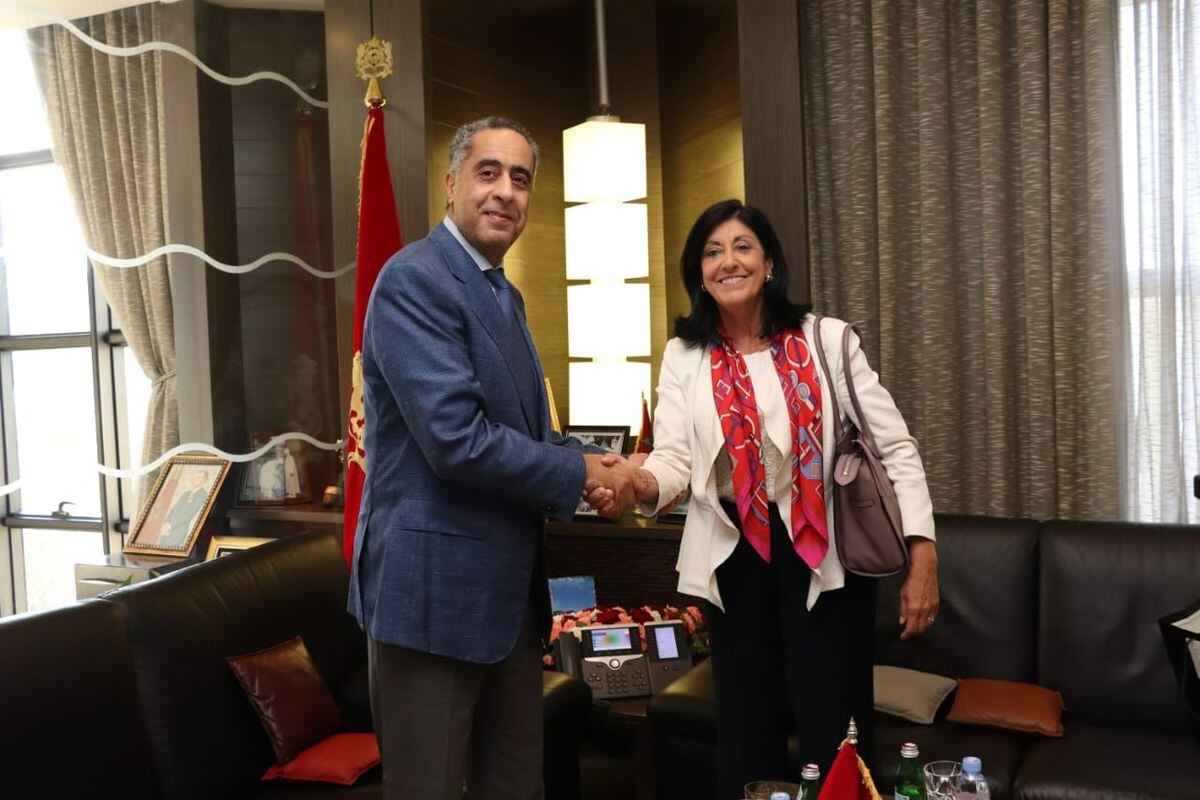The director of the CNI, Esperanza Casteleiro, greets her Moroccan counterpart, Abdelatif Hamuchi, on Thursday in Rabat.EFE (Moroccan Security/EFE)
The director of the National Intelligence Center (CNI), Esperanza Casteleiro, met this Thursday in Rabat with her Moroccan counterpart, Abdelatif Hamuchi, head of National Security and the General Directorate for Territory Surveillance (DGST, for its acronym in French). ) in an unprecedented public meeting aired by the official media.
Casteleiro, who has traveled to the Moroccan capital after a visit made in June to Madrid by Hamuchi, is at the head of a large delegation, in a gesture that is interpreted as a new step in the process of rapprochement between Spain and Morocco.
The meeting, the publicity of which veteran correspondents do not remember precedents, takes place in parallel to a high-level Spanish working visit in the field of security and intelligence, according to a statement from the DGST released by the official MAP news agency.
It pursues the objective of strengthening Spanish-Moroccan cooperation "in the regional context" and in areas of common interest in the face of the "increasing risks linked to terrorism, (religious) extremism, cybercrime and the different forms of cross-border organized crime, including clandestine immigration and drug trafficking.
Formally, both parties seek to consolidate cooperation in security matters to place it, according to the Moroccan statement, "at the level of the bilateral strategic association (...) in a context of new and growing challenges both nationally and internationally".
Spanish diplomatic sources consulted in Rabat declined to comment on Casteleiro's visit, which had not been announced by either country.
Hamuchi visited Madrid on a return stopover from a work trip with the CIA and the FBI in the United States last June, before the tragic mass entry at the Melilla border in which dozens of irregular sub-Saharan immigrants lost their lives. .
On that occasion there were no unusual photographs, as has happened now in Rabat, nor was the agenda of his official meetings in the Spanish capital at the head of an important delegation from the Moroccan security and intelligence services detailed.
The meeting between the leadership of the CNI and the DGST is staged in public in the midst of the growing antagonism between Rabat and Algiers, the consequences of which have affected Spain after the change in the position on the Sahara.
And also after the UN tried to reactivate this month the path for a political solution to the decolonization of Western Sahara, Spanish territory until 1975. The leaders of the Polisario Front, who cling to the self-determination plan through a referendum that would open the door to independence, designed three decades ago by the United Nations, in the face of the autonomy offered by Morocco, which in fact administers most of the former colony, are being sidelined on the international scene.
The Rabat government has entrenched itself in its thesis after the drift in its favor by the United States and several Western countries, including Spain, which now sees the proposal for Moroccan autonomy as the "most serious, realistic and credible".
The Polisario no longer considers Spain a "positive" actor in the solution of the conflict after accusing it of "allying" itself with Morocco's position.
"It has become an actor that creates more problems in the decolonization process," warned Sidi Omar, Saharawi representative to the UN.
A “reserved” report from the CNI, to which EL PAÍS had access last June, revealed that relations between the intelligence services on both sides of the Strait have gone through moments of particular tension.
During the diplomatic crisis between Spain and Morocco over the reception in Spain of the Polisario Front leader, Brahim Ghali, the Moroccan services activated a double “judicial and media” strategy in order to “harass” Ghali and “hinder his mobility”, as well as "create a state of opinion in the [Spanish] press related to their interests."
Maneuvers against the Polisario Front
The document, dated June 24 of last year, assured that Rabat used "many resources, including economic ones", in "reactivating all the complaints and lawsuits" filed before the Spanish justice system against the Polisario Front and its leader, "in addition to other new [complaints]”, and in “mobilizing the Moroccan community” to demonstrate against the decision to welcome Ghali in a hospital in Logroño after contracting covid.
The objective was "to put pressure on the Government of Spain to achieve a favorable position for Morocco in the dispute over Western Sahara", the report concluded.
It also remains to clarify the case of espionage on the mobile phones of members of the Government with the Pegasus computer program —including that of the president, Pedro Sánchez— on days coinciding with the crisis of the migratory avalanche towards Ceuta in 2021, which is being investigated by the National High Court.
The CNI attributed the Ceuta crisis to Rabat's "aggressive discourse" on Western Sahara, within the framework of a "pressure" strategy for Madrid to recognize its sovereignty over the former Maghreb colony.
Subscribe to continue reading
read without limits
Keep reading
I'm already a subscriber

